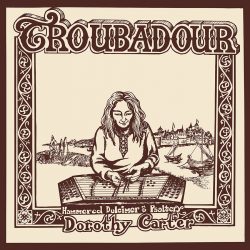Solid reissue of 1976 debut offering from renowned hammered dulcimer player.
 Dorothy Carter had a fascinating life and career; between her birth in New York City in 1935, through to her death in New Orleans in 2003, Carter travelled the world, performing traditional, medieval and experimental music, using a range of traditional stringed instruments, such as the hammered dulcimer, psaltery and hurdy gurdy.
Dorothy Carter had a fascinating life and career; between her birth in New York City in 1935, through to her death in New Orleans in 2003, Carter travelled the world, performing traditional, medieval and experimental music, using a range of traditional stringed instruments, such as the hammered dulcimer, psaltery and hurdy gurdy.
In the late 1950s Carter was in Mexico City, set on becoming a nun, however she met a group of US expats including Bob Rutman, David Demby and his partner Constance, who became very influential in Carter’s life and career. She returned with this group to New York and lived (for a while) in Greenwich Village, though she continued to travel, exploring the cultures, music and instruments of different countries. She also found time to bring up a family. The early 1970s found Carter, still with the group of friends, living on a farm in Maine, where they formed Central Maine Power Company, a troupe of musicians specialising in improvisation.
In 1996 with Katharine Blake of gothic rock band Miranda Sex Garden, Carter formed Mediæval Bæbes, a 12-strong, all-female ensemble performing traditional medieval songs and poetry set to music; the ensemble still exists although many of the personnel have changed over the years. Carter performed on the Bæbes’ first two releases; 1997’s “Salva Nos” which reached #2 in the UK classical music chart and “Worldes Blysse” (1998), which reached #1.
Carter’s debut album, “Troubadour” was originally issued in 1976. It’s a collection of Appalachian folk tunes, ancient psalms and hymns, some traditional tunes and others which are Carter’s own. Some of the melodies and playing are simply hypnotic. Recorded at Studio B in Boston, Massachusetts, the LP features Carter playing the hammered dulcimer, psaltery and flute; she also sings on some of the tracks. Carter is supported by Constance Demby who plays the guqin (a plucked seven-string Chinese musical instrument) and Sally Hilmer who plays the tambura (a long-necked fretless lute). Although Carter had been playing music for many, many years by this point, the sessions in Boston during 1976 which became “Troubadour“, marked the first time her music had been recorded.
“Troubadour” consists of 14 pieces, nine of which are instrumental; the music has a real timeless quality to it. It’s fair to say that the music will not appeal to everyone, but if you approach it with an open mind you may find that some of the pieces are surprisingly accessible; the instrumental tracks tend to be more accessible than the vocal tracks. For example, ‘Balinderry‘, despite being a mere one minute and 36 seconds in length has a really catchy melody; and ‘The Morning Star‘ is simply beautiful. Alternatively, it’s possible to lose oneself completely in the complex, hypnotic rhythms of ‘Binnorie‘, or ‘Visiting Song‘.
This is the first ever reissue of “Troubadour“, this follows 2023’s reissue of Carter’s sophomore album, 1978’s “Waillee Waillee“. The vinyl edition of the reissue reproduces the original album package, but with the addition an insert adorned with photographs of Dorothy and her collection of instruments, along with notes from producer of the reissue Eric Demby, who recounts the era from which the original album comes (his childhood). Demby’s father, David and step mother Constance, were very much part of Carter’s life at the time of the record’s recording and release.


